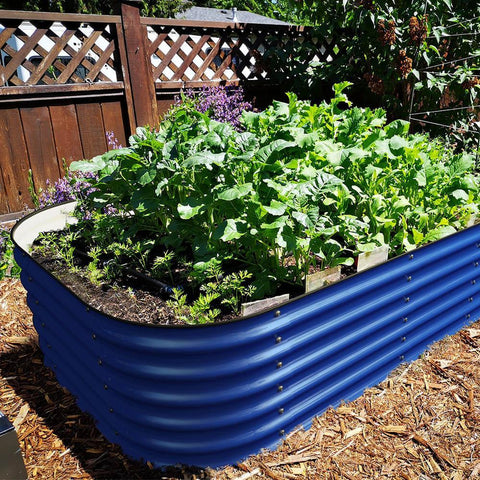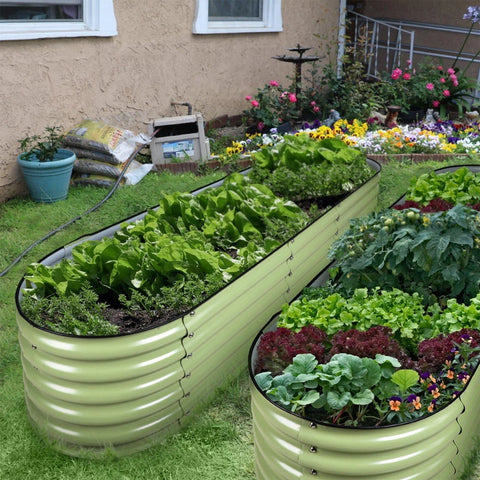Celebrating National Organic Harvest Month: Nourishing Our Planet and Ourselves
As autumn approaches, it brings with it a season of bountiful harvests and an opportunity to celebrate National Organic Harvest Month. This month-long observance, which takes place every September, highlights the importance of organic farming practices and encourages us to make mindful choices when it comes to the food we eat. In this blog from Olle garden beds, we will explore the significance of National Organic Harvest Month, the benefits of organic farming, and how you can participate in this eco-conscious celebration.
The Origins of National Organic Harvest Month
National Organic Harvest Month was established to promote organic agriculture and its positive impact on the environment, human health, and rural economies. It was first recognized in 1992 by the Organic Trade Association (OTA) and has since grown into an annual tradition. September was chosen as the month to celebrate organic harvests because it aligns with the peak of the harvest season in North America.
The Importance of Organic Farming
Environmental Sustainability: Organic farming practices prioritize soil health, crop rotation, and the use of natural fertilizers. These methods help maintain the fertility of the land, reduce soil erosion, and minimize the need for synthetic pesticides and herbicides. As a result, organic farming is more sustainable and helps protect our planet for future generations.
Health Benefits: Organic produce is grown without synthetic pesticides and genetically modified organisms (GMOs). This means that organic fruits, vegetables, and grains are free from harmful residues and potentially dangerous modifications. Choosing organic can contribute to a healthier diet and reduce the risk of exposure to harmful chemicals.
Supporting Local Communities: Organic farming often involves smaller, local farms that prioritize sustainable practices. By purchasing organic products, you are supporting local economies and helping to maintain vibrant rural communities.
Biodiversity: Organic farms tend to have greater biodiversity, including a variety of plant and animal species. This diversity is beneficial for the ecosystem and helps control pests naturally, reducing the need for chemical interventions.

How to Celebrate National Organic Harvest Month
Shop Organic: One of the simplest ways to celebrate this month is to choose organic products when you shop for groceries. Look for the USDA Organic seal, which ensures that the product meets organic standards.
Visit a Local Farmers' Market: Explore your local farmers' market and connect with local farmers who use organic practices. You'll not only have access to fresh, seasonal produce but also gain a deeper appreciation for the hard work that goes into organic farming.
Grow Your Own Organic Garden: If you have the space, consider starting your own organic garden. It's a rewarding way to experience the joys of growing your food while practicing sustainable agriculture.
Educate Yourself: Take this month as an opportunity to learn more about organic farming and its benefits. You can watch documentaries, read books, or attend local workshops and seminars on organic agriculture.
Share the Knowledge: Spread the word about National Organic Harvest Month and the importance of organic farming with your friends and family. Encourage them to make more mindful choices when it comes to their food.
Choosing Organic Seeds and Plants
The foundation of any successful organic garden is selecting the right seeds and plants. When planning your raised bed garden, consider the following:
Organic Seeds:
Start with organic seeds from reputable suppliers. Organic seeds are free from chemical treatments, ensuring that your garden remains truly organic from the beginning.
Heirloom Varieties:
Heirloom plants are known for their unique flavors and characteristics. They are often open-pollinated and can be saved year after year, promoting genetic diversity and sustainability.
Local Adaptation:
Select plants that are suited to the climate and growing conditions in your area.This will reduce the need for excessive watering, fertilizing, and pest control.
Companion Planting:
Explore companion planting techniques to create a balanced ecosystem within your raised beds. Companion plants can help repel pests, improve soil health, and increase overall yield.

Maintaining Organic Practices
Once your raised bed garden is flourishing, it's essential to maintain organic practices to ensure a chemical-free harvest. Here are some tips:
Compost and Mulch:
Regularly add compost to your raised beds to enrich the soil with organic matter and nutrients. Mulch with straw or leaves to retain moisture and suppress weeds.
Organic Fertilizers:
Use organic fertilizers such as compost tea, fish emulsion, or bone meal to provide essential nutrients to your plants.
Crop Rotation:
Practice crop rotation to prevent soil depletion and deter pests and diseases from building up in the soil.
Handpick Pests:
Regularly check your plants for pests and hand-remove any that you find. Ladybugs and birds are good examples of natural predators that can help manage pest populations.
The Joy of Harvest
As your raised bed garden matures, you'll experience the true joy of organic gardening during harvest time. The flavors and aromas of homegrown, organic produce are unparalleled. Here are some tips for a successful and satisfying harvest:
Harvest at the Right Time:
Pick your fruits and vegetables when they are at their peak ripeness. This guarantees the best nutrition and flavor.
Preserve the Harvest:
If you have an abundance of produce, consider preserving it through canning, freezing, or dehydrating. This allows you to enjoy your homegrown food year-round.

Share the Bounty:
Share your organic harvest with friends and neighbors. It's a wonderful way to build a sense of community and spread the joy of organic gardening.
National Organic Harvest Month reminds us of the vital role organic farming plays in building a sustainable future for our planet and nourishing our bodies with wholesome, chemical-free foods. By supporting organic agriculture and making informed choices, we contribute to a healthier environment, healthier bodies, and stronger communities. This September, let's celebrate the organic harvest and the positive impact it has on our world.
